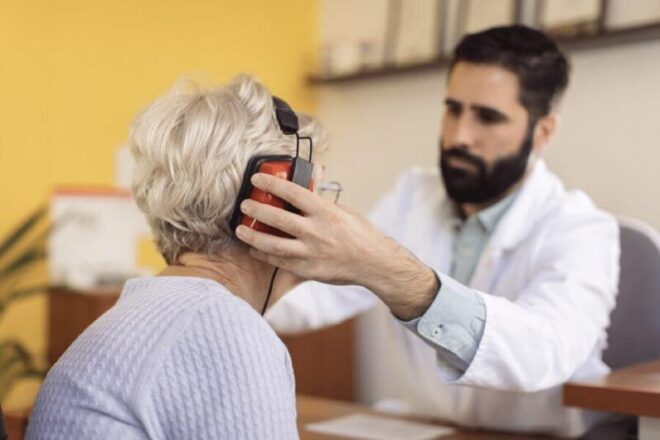Contrary to what you may believe, hearing aids will not make your hearing worse. In fact, the opposite is true; your health can worsen without the use of hearing aids. Research has shown there are health-related links to hearing loss.Left untreated, hearing loss can lead to a decline in cognitive health, worsening balance and an increased chance for falling, and higher rates of depression and isolation
.Don’t believe misinformation about hearing aids
Some believe that exposure to increased sound through hearing aids could harm their hearing further. But there is a difference between prolonged exposure to loud music in earbuds or headphones and wearing professionally programmed and fitted hearing aids.
While exposure to loud music, dangerously high noise levels, including in many workplaces can contribute to hearing loss, the amplification provided by hearing aids is not dangerous for people who need them.
Wearing someone else’s hearing aids is similar to trying on someone’s prescription glasses, and not advised. If you do wear someone else’s devices, you risk damaging your ears.
Hearing aids will not damage your hearing, but they need to be programmed to your specific hearing loss by a trained professional. Some hearing amplification devices could worsen hearing as they are not professionally programmed and may not be suitable for your needs.
What about loud, sudden noises?
Hearing aids digitally process then amplify sound, so it is natural to wonder what happens if you hear a loud sudden sound, like a siren or an explosion. Fortunately, wearing hearing aids does not put you at an increased risk of damage than someone without hearing aids. Our devices have audio input limits and safeguards in place for such instances, as well as noise-canceling technology. This means that you don’t have to worry about those loud environmental sounds putting you at an increased risk for more hearing damage.
This is the benefit of using an experienced audiologist or hearing care provider for your hearing aid needs. They understand the technology, and they can fit, program, and properly adjust your device for long-term comfort.
Why does my hearing seem worse when I take my hearing aids off?
When you begin to wear hearing aids, it takes your brain some time to get used to increased environmental sounds to the brain. After wearing them for a while, your brain gets used to the new and improved sound quality that hearing aids provide, and resets your normal or baseline hearing to the higher volume into account. Once you remove your hearing aids, sounds may be more dull or pitchy. This is not due to your hearing having worsened, but rather your brain’s perception of your new ability to hear crisp detail and what is happening in your environment.
If hearing aids don’t worsen my hearing loss, will they stop or slow it altogether?
Hearing aids are capable of slowing the progression of hearing loss, by helping to exercise the auditory nerve cells inside your ear. When underutilized, these nerve endings weaken and decline. Just like with any muscle our brain has a “use it or lose it” principle. Wearing your devices can prevent further decline in your ability to detect and understand speech. The use of hearing aids will not get rid of hearing loss once and for all as most hearing losses are not reversible, however early treatment can definitely show better outcomes versus waiting.
Not all hearing technology is the same
It’s important to understand your hearing aids’ features. Most professionally programmed hearing aids have the ability to be set for different environments. Other common features on today’s devices include advanced noise processing, excellent microphones, and Bluetooth connectivity. Some can even be wirelessly streamed to your television.
Hearing aids have limits on volume exposure for safety and comfort. Hearing aids should not be confused with hearing protection, however. If you find that you are exposed to loud sounds through work or recreation, be sure to ask your professional about custom hearing protection for your needs.
Getting a hearing aid
In order to be properly outfitted for a hearing aid, find an audiologist near you and schedule an appointment for diagnostic testing. Having your hearing tested is a painless and quick process.
Your professional will exam your ears, test your ability to detect sound, and check how well your brain is understanding the sounds your ears are collecting. Then the two of you will discuss what options are best for your treatment.
The qualified, compassionate hearing care professionals at Next Level Hearing Care are ready to support you in finding a hearing aid that fits your needs, lifestyle, and budget.



